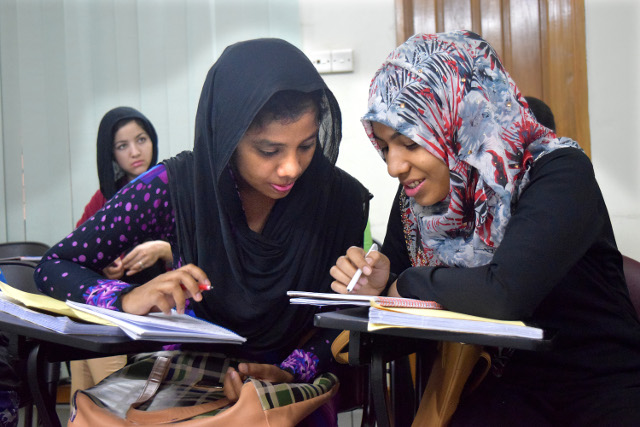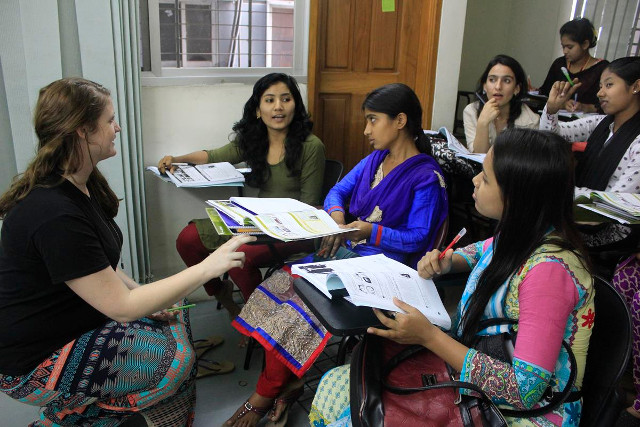Pathways for Promise

(Students in the Pathways for Promise program at the Asian University for Women in Chittagong, Bangladesh.)
This post is part of a sponsored collaboration between the Ethical Writers Coalition and the Asian University for Women.
Last week, I bumped into a former student of mine. She was eager to tell me that she has applied to a local university, and hopes to study History. It was wonderful to see her after all these years, and her excitement for her future plans was really inspiring.
As an ethical blogger and a former teacher, I believe in the power of education. For women in developing countries, education offers opportunities that will positively impact their own lives, as well as those of their potential future children and their larger communities, too. When women receive a secondary education and beyond, they are more likely to prolong marriage and childbirth, to seek prenatal care and a skilled birth attendant, to immunize their children, to have access to better nutrition for themselves and their children, and to send their own daughters to school.
The Asian University for Women, founded in 2008 and located in Chittagong, Bangladesh, is an international university focused on empowering women throughout Asia and the Middle East. Currently, AUW serves women from 15 countries, 35 ethnicities, and 25 languages in their programs, including two pre-university bridge programs. Pathways for Promise, started in 2016, is a program dedicated to providing higher level education specifically to marginalized groups of women, including garment workers and Rohinga women, a minority group that has been systematically oppressed in Burma and Bangladesh. Almost 4 million women work in the Bangladesh garment industry, and Pathways for Promise has partnered with several clothing factory owners who agreed to pay their employees’ wages while the women attend school for five years, eventually earning an undergraduate degree in Liberal Arts or Science.

(Students in an English as Second Language class in the Pathways for Promise program at the Asian University for Women in Chittagong, Bangladesh.)
Pathways for Promise marks the first step in the college experience and the year-long program focuses on English language development and communication. The second year, Access Academy, continues with college preparation, followed by three years of university classes. The application process is quite rigorous, yet in the first year of the program, over 1,000 garment workers applied. Currently, 30 former workers and 50 Rohinga women are enrolled in this first step toward earning their college degrees. In addition, students and recent graduates are participating in a new initiative, Education Cells, which gives them the opportunity to teach garment workers during weekly classes that are similar to the Pathways for Promise program. It’s an excellent way for the students to practice their own teaching skills while serving as role models for other women who may wish to pursue their educational dreams, too.
Since 2013, the Asian University for Women has graduated 444 women, and most found employment or applied to graduate school within one year of receiving their degrees. Many of the alumnae attend graduate school in other countries, but 85% of employed AUW graduates return to work in their home countries, which will benefit their local communities. AUW has plans to increase student enrollment by 150% over the next seven years, and many of these women will undoubtedly come from garment factories.
I was incredibly inspired by my former student’s exciting news and I’m equally inspired by the work of the Asian University for Women and its Pathways for Promise program. It’s absolutely true that investing in the education of girls and women positively impacts society as a whole, and AUW’s amazing initiative is solid proof.
(To learn more about the Asian University for Women, please visit their site and Facebook page. Statistics and photographs provided by AUW.)
Suggested Reading:
“Dresses to Degrees: University opens its doors to Bangladesh garment workers” from The Guardian.
Partners, Not Saviors: Pathways for Promise Promotes Change from Within, from StyleWise.
Women Have Potential Beyond the Factory Floor: This Initiative is Changing the Game, from The Peahen.
Forget the Slogan T-Shirt: Feminism is Educating Female Garment Workers, from EcoCult.
The Future is Female (Garment Workers), from The Note Passer.
Whitney Bauck, Fashionista + Digital Activism, from Conscious Chatter podcast.

[…] Pathways for Promise | Walking With Cake […]